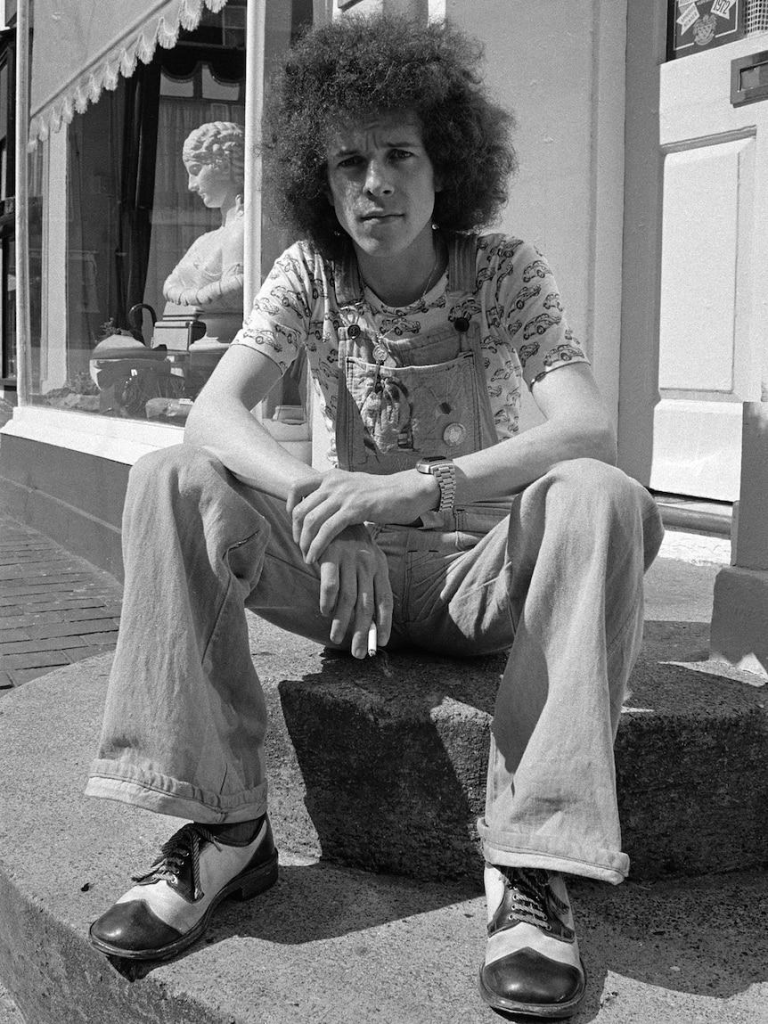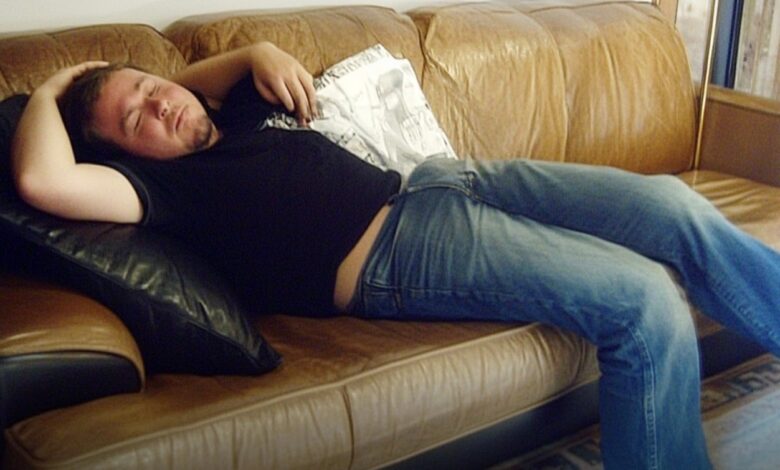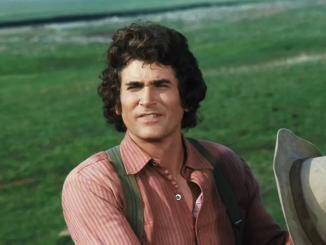“I look at my role as being a friend of Canberra Hospital, I can bring some pleasure and happiness sometimes to people who are really in difficult times in their lives.”
With backing music from a Bluetooth speaker, Sayer croons his way around the cancer wards, making a human connection with everyone he comes across.

Canberra Region Cancer Centre Operations Manager Caroline McIntyre says Sayer’s visits are typically kept a surprise for patients and staff.
“He’s always come in so discreetly,” she says.
“Normally it’s just very quiet, he comes up in the back lift and says hello to literally everybody.
“Some of them are doing it tough, and to have a little bit of joy and light – it really gives them a lift.
“What makes me happy is to see people getting chemo on their feet dancing.”
Jamming with Jimi Hendrix, Countdown and the Troubadour
Originally a graphic designer by trade, English-born Leo Sayer rose to pop prominence in London in the late 1960s, as a singer-songwriter – and was soon adopted by Australia as an honorary son after his first tour here in 1974.
He went on to become an Australian citizen in 2009.
Sayer was a regular on ABC TV’s Countdown during the 70s and 80s, performing chart-toppers like “You Make Me Feel Like Dancing”, “When I Need You”, “More Than I Could Say” and “Orchard Road”.

He blushingly admits they were wild days – when he didn’t always live up to his “good-guy” public persona.
“It was mad, I mean, Top of the Pops in England, Countdown over here,” he says.
“You were mobbed by the fans, I remember being dragged out of a limousine the first tour that I came here, and then speaking to crazy people like Molly Meldrum on TV and trying to sort of like take it all in.”
It seems hard to believe – the petite, well-spoken singer, with a mane of curly hair that inspired changing his name from Gerard to Leo – beating off mobs of screaming fangirls.
Sayer circulated in superstar company, becoming close friends with former Beatles George Harrison and Paul McCartney, collaborating with Roger Daltrey of The Who, and even sharing a sly cigarette or two with John Lennon and Yoko Ono who had a flat above his design studio.
“I met Jimi Hendrix right at the start of his career. I actually jammed with him, playing the harmonica, and him playing the guitar,” he says.
Recalling his 1975 opening night at the famous Troubadour Club in Los Angeles, he looked up to see an intimidating line-up of fans in the front row.

“It was David Bowie, Elton John, and ‘The Fonz’ [Henry Winkler].”
Alongside them: John Cleese, Mick Jagger, Bernie Taupin, and comedian Marty Feldman.
“We never thought it would last, we were adapting to things around us, writing songs about things that are around us,” he says.
“And we thought they were only for our generation — so the amazing thing is my music’s become like a fine wine, where you lay it down and years later, it becomes a collector’s item.
“We’re in an age where the music that I make, young kids are actually latching onto it now, and they’re finding that that generation and that style of music we made is as current now as anything.”
Sayer’s health battles, still spreading hope at 76
Leo Sayer says his hospital charity work caps off a career dedicated to providing joy through music.
“It’s a nice piece of synchronicity really, because I was born in the grounds of a hospital in Shoreham by Sea in Sussex, near Brighton in England,” Mr Sayer said.
“I suppose I’ve always felt comfortable in hospitals and being around hospitals.
“Growing up, my dad was a hospital engineer, Mum was a nurse, my sister was a matron.”

Sayer has health struggles of his own, including three stents in his heart, which help him have a genuine connection to the hospital patients he entertains.
“[My music] is providing something that isn’t taking away from any of the treatment that’s going on. It’s providing something that’s just putting a smile on peoples’ faces.
“Music is communication and that’s what this is all about, we’re communicating, we’re making people feel better.
“We’re not healing people with music, but we are making them feel better about their healing.
“To sell out Canberra Hospital will do me fine.”
After returning home from a month-long vacation, a woman wakes up the next morning to discover a stranger sleeping on her couch

Megan was thirty-four, never married, had no kids, and worked a demanding job as a producer. She was tired of hearing questions about her personal life from her mother, but deep down, she knew her mother was right—it was time to change something. Little did she know, the change would find her first.
It was a late evening, and Megan was driving home after a long, exhausting month of what was supposed to be a vacation.
Her hands gripped the steering wheel tightly as she chatted on the phone with her mother, Dina. The road ahead was quiet, with only the faint glow of the car’s headlights cutting through the darkness.
Despite the peace outside, Megan felt anything but relaxed.
“Megan, I don’t understand how you can go on vacation and still work the entire time!” her mother’s voice echoed through the car’s speaker. The concern in Dina’s tone was unmistakable.
“You’re always on your phone, always busy. You’re 34 years old, dear. When are you going to start focusing on yourself, on your personal life?”
Megan rolled her eyes, though she knew her mother couldn’t see her. A hint of frustration crept into her voice.
“Mom, I didn’t have much choice. Things never go as planned at work, and as a producer, my attention is needed constantly. You know that.”
Dina, persistent as always, wasn’t ready to let the conversation drop.
“But when will I get to see grandchildren? You’re too focused on your career, and I’m worried you’ll never settle down. Don’t you want a family someday?”
Megan sighed, gripping the wheel a little tighter as she tried to keep calm. She loved her mother, but this conversation was becoming all too familiar.
“Mom, I really can’t talk about this right now,” she said, faking a crackle in her voice. “The signal’s bad. I’ll call you tomorrow, okay?”
Before Dina could continue, Megan quickly ended the call, feigning static noises to make it seem like the connection had failed.
She glanced down at the phone and let out a breath she hadn’t realized she was holding.
Pulling into her driveway, Megan parked the car and stared at her house for a moment.
She felt drained, both from the conversation with her mother and from the past few weeks.
What was supposed to be a restful vacation had turned into yet another working trip, with her phone constantly buzzing with problems at work.
For the entire month, she hadn’t been able to fully unplug. She didn’t even know what “rest” meant anymore.
After grabbing her bags from the trunk, Megan walked inside her dimly lit house, too tired to bother turning on all the lights.
She set her bags down by the door and paused for a moment. Something felt off. Glancing around, she noticed that one of the windows on the first floor was slightly open.
Puzzled, she tried to remember if she had left it like that before leaving for her trip. She shrugged it off, assuming she had simply forgotten to close it. It had been a busy month, after all.
Megan shut the window, turned off the last light on the first floor, and headed upstairs.
She barely had the energy to change into her pajamas. She kicked off her shoes, not even bothering to check if everything was in order.
Without thinking, she collapsed into her bed, letting her head sink into the pillow.
The familiar comfort of her bed was a relief, and within moments, Megan was fast asleep, her mind already letting go of the chaos of the day.
Little did she know that tomorrow would bring an unexpected surprise—one she never could have anticipated.
The next morning, Megan was jolted awake by the buzzing of her phone. Half-asleep, she groaned as she answered it, recognizing the overly enthusiastic voice of her assistant, Lisa.
Lisa’s high-pitched chatter filled her ears, rattling off a long list of meetings and tasks for the day at a speed that made Megan’s head spin.
“Lisa, please… slow down,” Megan mumbled, trying to focus as she stumbled out of bed. She held the phone between her ear and shoulder while getting dressed, lazily brushing her teeth, and starting her coffee machine.
The warmth of the coffee was barely hitting her system when something made her stop mid-sip—loud snoring coming from the living room.
Her body tensed as her brain struggled to process what she was hearing. Who is in my house?
“Lisa, I’ll have to call you back,” she said abruptly, hanging up the phone before Lisa could respond. Heart racing, Megan cautiously walked toward the living room, each step feeling heavier than the last.
Peeking inside, she couldn’t believe her eyes. A man—fully dressed with boots still on—was sprawled across her couch, snoring loudly.
Dirty footprints trailed from the window she had closed the night before to where the man now lay. Megan’s mind raced with questions. Who is this guy? How did he get in?
Her eyes narrowed, and without thinking twice, she darted to the kitchen, grabbing the nearest weapon she could find: a broom.
She marched back to the living room and jabbed the man with the handle.
He stirred, groggy and confused, blinking as he rubbed his eyes.
“Who are you?” Megan demanded, doing her best to keep her voice steady despite the panic rising in her chest.
The man, still half-asleep, sat up slowly. “Uh… I’m George,” he muttered, his words slurring together. “How did I get here?”
“I was about to ask you the same thing!” Megan snapped, frustration mixing with confusion. “Why are you on my couch?”
George blinked, clearly disoriented, as he looked around. “I don’t remember much… I was out with some friends, and then… nothing. I guess I drank too much.”
Megan sniffed the air and immediately recognized the stale scent of alcohol. It didn’t take long to piece together what had happened—George had been blackout drunk and somehow ended up in her house.
Her anger started to fade, replaced with a mix of disbelief and reluctant sympathy.
“Well, you’re lucky I didn’t call the police,” she said, setting down the broom. “Take these.”
She handed him a bottle of aspirin and watched as he gratefully swallowed a couple of pills.
“I need to leave for work, but this time make sure you use the door when you go. Not the window.”
George, still looking sheepish, nodded. “Thank you… and I’m really sorry.”
Megan sighed. “Just… don’t make a habit of it.” With that, she grabbed her things and headed out the door, leaving George to process his own mess.
That evening, Megan drove home after a long, exhausting day at work. Her eyes felt heavy, her body sore from sitting in meetings and staring at screens for hours. Her stomach growled in protest, reminding her that she hadn’t eaten anything substantial all day.
There hadn’t been a single free moment to stop for groceries, and she sighed at the thought of coming home to an empty fridge.
As Megan walked into the house, she froze. The familiar smell of her dim living room was replaced by something unexpected—the soft glow of candles flickered around the room, casting a warm, inviting light.
The dining table, which she had left bare that morning, was now set with plates, silverware, and an array of delicious-smelling dishes.
At the center of it all stood George, looking slightly awkward and sheepish but also determined. He rubbed the back of his neck nervously as he saw her expression.
“What is this?” Megan asked, her voice a mixture of shock and confusion.
George shifted his weight from one foot to the other.
“I… I felt really bad about what happened this morning,” he explained, his voice soft. “So I cleaned up the mess I made, and I wanted to cook you dinner. You know, to make it up to you.”
Megan blinked, still processing the scene before her. She had expected to come home, collapse onto the couch, and figure out how to deal with her hunger.
Instead, she found this—a stranger who had passed out on her couch that morning, now standing in her living room with an entire meal prepared.
“You didn’t have to do this,” she said, still a bit in disbelief.
“I know,” George replied, “but I wanted to. It’s the least I could do after… well, everything.” He offered a small, apologetic smile.
George began to gather his things, ready to leave and give her space, but Megan stopped him.
“Wait,” she said softly, not wanting him to rush off just yet.”
You’ve already gone through all this trouble to make such a nice dinner. Stay and have it with me. I can’t eat all of this by myself, anyway.”
George hesitated, his uncertainty clear.
“Are you sure? I didn’t mean to intrude.”
Megan smiled warmly, her exhaustion from the day fading just a little. “Yes, I’m sure. Besides, it would be nice to have some company.”
They both sat down at the table, and as the scent of the warm food filled the air, Megan couldn’t help but feel a surprising sense of calm.
The hectic day seemed to slip away, replaced by an evening of unexpected comfort.
They sat down at the table, the soft glow of the candles creating a peaceful atmosphere. As they began to eat, the earlier tension seemed to melt away with each bite.
George, now more comfortable, started telling Megan about his wild night out with friends. He laughed as he explained how too much fun and a little too much to drink had led him to her couch, of all places.
“I honestly didn’t even realize I wasn’t home until I woke up this morning,” George chuckled, shaking his head.
“And when I saw you standing there with a broom, I thought I was in serious trouble.”
Megan couldn’t help but laugh along, her earlier frustration fading with each word.
The stress she had carried home after a long day at work seemed to vanish, replaced by the simple joy of sharing a meal and a conversation with someone who made her laugh. It felt like a break from the routine, like a breath of fresh air.
For the first time in what felt like ages, Megan felt completely relaxed. George was easy to talk to, and the conversation flowed naturally. They joked, swapped stories, and enjoyed the food he had so thoughtfully prepared.



Leave a Reply